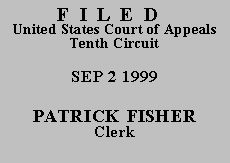

| JAMES JOSEPH OWENS, | |
| Petitioner - Appellant, | |
| v. | |
| WARDEN PUGH, | |
| Respondent - Appellee. |
Petitioner-Appellant James Joseph Owens, a pro se prisoner, appeals the dismissal of his petition for writ of habeas corpus filed pursuant to 28 U.S.C. § 2241 against the Warden of the United States Penitentiary at Florence, Colorado, where he is presently incarcerated. The United States District Court for the District of Colorado dismissed Petitioner's § 2241 action for lack of jurisdiction, ruling that Petitioner failed to demonstrate that the habeas corpus remedy provided under 28 U.S.C. § 2255 was inadequate or ineffective. We review a district court's denial of a habeas corpus petition de novo. See Bradshaw v. Story, 86 F.3d 164, 166 (10th Cir. 1996). Because Petitioner proceeds pro se, we construe his pleadings liberally. See Riddle v. Mondragon, 83 F.3d 1197, 1202 (10th Cir. 1996).
Our review of the record indicates that Petitioner is challenging the validity of two federal court convictions and the sentences imposed as a result of those convictions, one imposed in 1979 by the United States District Court for the Eastern District of North Carolina and the other in 1983 by the United States District Court for the Central District of California. We have previously instructed Petitioner that "[his] challenges to the legality of the sentences cannot be brought in the District of Colorado, where he is confined. They must be brought under 28 U.S.C. [§] 2255 in the sentencing courts." Owens v. Story, No. 95-1367, 1995 WL 745962, at **1 (10th Cir. Dec. 15, 1995). That instruction still applies. See Bradshaw, 86 F.3d at 166.
On appeal, Petitioner contends that his immediate § 2241 habeas corpus motion is appropriate because it falls under the safety-valve provision of § 2255 providing that a petitioner may file a § 2241 habeas corpus petition when relief under § 2255 "is inadequate or ineffective to test the legality of [the] detention." 28 U.S.C. § 2255. Petitioner argues that because he succeeded in getting his prior state convictions expunged from his record in 1997 the federal sentences imposed in 1979 and 1983 and enhanced at the time on the basis of those prior state convictions must be reopened and reconsidered. He claims that the sentencing courts and the United States Courts of Appeals for the Fourth and Ninth Circuits have deprived him of adequate and effective relief by denying his recent motions to file second or successive § 2255 habeas corpus petitions. That argument, however, fails to demonstrate the inadequacy and ineffectiveness of the § 2255 remedy.(1) As we explained in Petitioner's earlier case, "dissatisfaction with the results [Mr. Owens] has obtained in the sentencing courts does not establish that [§] 2255 was an inadequate or ineffective remedy." Owens, 1995 WL 745962, at **1 (citing Tripati v. Henman, 843 F.2d 1160, 1162 (9th Cir. 1988); McDowell v. Willingham, 354 F.2d 232, 232 (10th Cir.1965)).
We note that Petitioner was given an opportunity to demonstrate the inadequacy of his § 2255 remedy. However, in response to the magistrate judge's order to show cause why the application under § 2241 should not be denied because Petitioner has an adequate and effective remedy under 28 U.S.C. § 2255, Petitioner only accused the court of treating him differently than two white inmates who have counsel and argued that the court should hear his claims merely because he has diligently pursued them for ten years. The district court thoroughly reviewed the merits of both arguments and denied Petitioner's § 2241 motion. For substantially the same reasons articulated by the district court in its Order dated April 16, 1999, we AFFIRM.
The district court also denied Petitioner's application to proceed in forma pauperis. Upon a careful review of the record, we conclude that Petitioner has not shown the existence of a reasoned, nonfrivolous argument to demonstrate the inadequacy and ineffectiveness of his § 2255 remedy. We DENY his motion to proceed on appeal in forma pauperis.
Entered for the Court
Monroe G. McKay
Circuit Judge
*. This order and judgment is not binding precedent, except under the doctrines of law of the case, res judicata, and collateral estoppel. The court generally disfavors the citation of orders and judgments; nevertheless, an order and judgment may be cited under the terms and conditions of 10th Cir. R. 36.3.
1.Petitioner's conclusory allegations presented in his Affidavit Containing New Information and Affidavits Containing New Evidence filed June 28, 1999, July 22, 1999, and August 23, 1999, respectively, do not change our conclusion in this regard. The information presented in these documents challenges the validity and legality of Petitioner's sentences, not their execution, and therefore should be brought before the sentencing courts under § 2255.